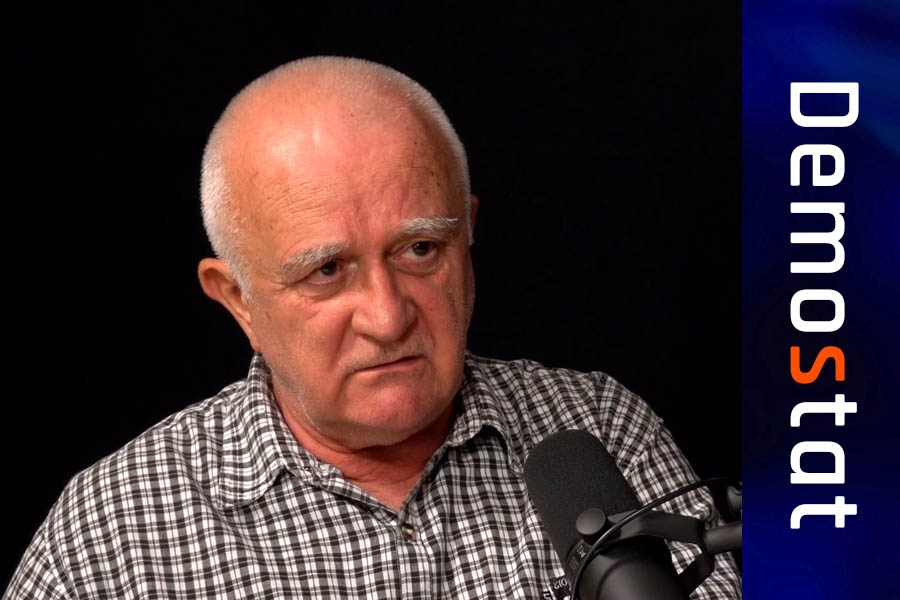In the north of Kosovo, there are security risks and a deep security crisis that is militarized, says Dusan Janjic, the founder of the Forum for Ethnic Relations, in an interview with Demostat. He points out that no one can guarantee that incidents will not occur. He highlights that in Kosovo, some individuals have received training from the Wagner Group and Islamic jihadists connected to Palestine and Russia. Janjic also mentions in the "Pola sata Demostata" that Bosnia and Herzegovina is the number one hotspot in the region. He believes that after the elections in Serbia, Kosovo, the EU, and the US, there will be an international conference where all previously discussed and accepted solutions will be put forward.

In the north of Kosovo, there are security risks and a deep security crisis that is militarized, says Dusan Janjic, the founder of the Forum for Ethnic Relations, in an interview with Demostat. He points out that no one can guarantee that incidents will not occur. He highlights that in Kosovo, some individuals have received training from the Wagner Group and Islamic jihadists connected to Palestine and Russia. Janjic also mentions in the "Pola sata Demostata" that Bosnia and Herzegovina is the number one hotspot in the region. He believes that after the elections in Serbia, Kosovo, the EU, and the US, there will be an international conference where all previously discussed and accepted solutions will be put forward.

Political instability across Kosovo exists, but security risks exist primarily in the north, according to Janjic.
Referring to the conflict in Ukraine, which has raised the stakes in both the Kosovo and Bosnian conflicts, Janjic adds that relevant assessments suggest that a scenario similar to what happened in May, when demonstrators attacked and injured 90 KFOR personnel, is currently unlikely. However, no one can guarantee that one, two, or all sides will not initiate incidents.
"Not only Kurti or Vucic but also criminal groups can organize occasional terrorist clashes, armed conflicts... A part of the civil protection has not been disarmed, and there is also a group of people trained by the Wagner Group. On the Albanian side, there is an Islamic jihad linked to Palestine and Russia," Janjic said in the "Pola sata Demostata" online show.
He states that the West is not the only party concerned about what might happen in the north; Russia is also involved.
Janjic adds that the assessment is that Belgrade will not send the military, police, or gendarmerie to northern Kosovo, nor will they be allowed to cross the administrative line, which was a concern last year. Furthermore, Belgrade does not desire such a scenario politically.
On the other hand, the Serbian List is discredited and cannot mobilize the population for such actions.
It is estimated that a minor conflict in Kosovo would primarily benefit Putin and Russia, demonstrating the inability of NATO and the West to control such a minor situation.
When asked whether such occasional conflicts can be controlled, Janjic explains that they can be easily managed but not necessarily stopped.
He also states that politicians are playing a game that motivates such activities and that they are fighting for military-police control of the territory in northern Kosovo rather than for the survival or betterment of Serbs integrated into Kosovo.
When asked if he could imagine a situation where Serbian security forces would enter Kosovos territory and move south of the Ibar River, Janjic mentions that part of the security structures already operates in the north, and it is possible to relocate a number of gendarme members. However, in a larger sense, its not feasible.
"Can the gendarmerie pass? Covic tried to misuse it in 2004 to stage the entry of the gendarmerie to protect the people, but in reality, it was an attempt to divide Kosovo, and it didnt work even then. General Krga did not allow it, and even Tadic didnt fall for it, although he found the idea appealing," Janjic stated.
In response to how the international community would react in such a case, Janjic mentions that there are plans that anticipate that as soon as a crisis situation arises, separation and deterrent forces would be deployed around the administrative line by KFOR.
"If this is connected with possible conflicts in Bosnia and Herzegovina, then NATO will secure Serbias external borders, but lets not get ahead of ourselves..." Janjic said.
He emphasizes that if Belgrade were to initiate such an action, it would practically contribute to the legalization of the Kosovo army because it would be necessary to close the borders.
"This would be the first opportunity for Kosovos security forces, and Belgrade is well aware of that," Janjic noted.
He also adds that Belgrade understands that withdrawing Serbs from the police forces it allowed Kurti to change the security reality in the north.
He also mentions that it should not be ruled out that actions may be taken without the knowledge of the authorities in Belgrade, possibly through the involvement of fan groups or mercenaries under Russian control.
Speaking about the Association/Comunity of Serb Municipalities (ZSO), Janjic says that the ZSO has become a political tool to gain and retain power in Belgrade.
He notes that the French-German proposal has addressed the issue of status.
"Thats the maximum for a status solution – Serbia recognizes the existence of the Republic of Kosovo but doesnt send ambassadors or recognize its international legal status. Thats the maximum they can get; its like Palestine vis-à-vis Israel," says Janjic.
Janjic believes that once the elections in Serbia, Kosovo, the EU, and the US are completed, an international conference will be organized by the Quint (comprising the United States, United Kingdom, Germany, France, and Italy). All previously discussed and accepted solutions will be put forward during this conference.
When asked about the concept of a frozen conflict, which opponents of dialogue often suggest as a possible solution for Kosovo, Janjic says that nothing in life can remain stagnant, and a frozen conflict can often escalate through clashes.
"Delay it until we find a solution. In the meantime, reality changes. Kurti has established a situation where Serbs have not returned to institutions; he fills positions through competitions and shares Serbian quotas with non-Albanians. There are no Serbs in the judiciary. He has created conditions not to control the territory but has significantly limited Serbias ability to do anything legally," Janjic stated.
When asked if it can be said that Vucic is more constructive in the dialogue, Janjic says that Serbia is a much more serious player, regardless of who leads it, and in the small world of the Western Balkans, Serbia is a potential desired leading partner.
"We cannot imagine prioritizing Kosovos entry into NATO while Serbia remains outside," Janjic said, adding that Albanians became partners due to a combination of circumstances, including poor decisions made by Slobodan Milosevic.
Regarding how he understood the EU proposal that was on the table at the last meeting in Brussels, Janjic says it was a paper with six steps that ask for something that, according to him, should not be accepted, which is that Serbs participate in the elections in four municipalities in northern Kosovo as soon as possible, without hesitation or conditions.
"It seems naive, but I am against it, warning Vucic not to accept it. There are several reasons why it should not be accepted and why its a trap. Because the elections were illegitimate and illegal. Second, Kurti devised a procedure to dismiss mayors, as if he couldnt remove them as he appointed them; its a political decision. Third - this can only be part of a package that does not include the return of Serbian representatives to all institutions so that you would have these elections first, and the EU avoids that because they encouraged Kurti to go to the elections," Janjic said.
He questions why Belgrade and Vucic, as a politician and a state, would risk legitimizing Kurtis political adventure when they know it will cause dissatisfaction among Serbs. It would also show that Vucic did not have a plan B when he withdrew people from institutions.
"Then you have domestic political problems; there is no opposition that will not use this, and I think serious division within the ruling coalition will begin. Then the talk of betrayal starts," Janjic said, adding that someone who wants an unstable situation in Serbia could exploit this.
Janjic also hopes that Vucic will use the UN session to lobby for two packages: a package for returning Serbs to institutions and a security package.
Bosnia and Herzegovina (BiH) is the number one hotspot in the region, says Janjic, emphasizing that many are interested in seeing a limited armed conflict occur in that country.
"The politics of the Republic of Srpska (RS) and Milorad Dodik, with the support of Belgrade, do not provide guarantees that Dodik will not go all the way, which is to declare secession and carry out military-police actions towards former Yugoslav Peoples Army (JNA) barracks that, in his opinion, belong to RS," Janjic said.
He states that the dark scenario of an armed conflict is now in the hands of Dodik, his "sponsors from the Kremlin," and, to some extent, Vucic.
"But Vucic cannot twist Dodiks arm; he can influence, do a lot, and ultimately make a clear distinction that war as a means of personal defense, including personal defense for Dodik, rather than collective defense of Serbs, is out of the question," Janjic says.
Janjic adds that Vucic is losing more than he can gain from Dodik, and both Serbia and the Republic of Srpska are losing in this situation.
Published on September 22nd, 2023
In all societies there are issues that are rather being skipped. Certain...
The neoliberal path, started in 2001, has led to especially bad results in Serbi...
For centuries, the region was subsumed within the Ottoman and Hungarian Empires,...
"Serbia has returned to the systemic and anti-systemic position of the political...
In reality, Serbia is closer than ever to NATO. In the course of the last five y...